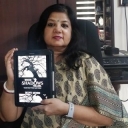People often ask me if there is a strong autobiographical element in my book Shadow in the Mirror and I ward them off with an enigmatic (or so I would like to believe) smile.
‘Is Vinny’s character based on your life as a journalist?’
This question gets me thinking. When I was writing my story, did I unconsciously write myself into the story, a younger me?
What kind of journalist is Vinny? How well would she fit in with the idea of the modern, hard-boiled journo of today? Would she fit in or stand out like a sore thumb?
The story starts with the death of the beautiful Nita who has fallen from her balcony. Vinny is present at the scene, and from the start, it is apparent that she is uncomfortable. ‘I am a vulture as well, even if it is my job that makes me one.’
While the other reporters gaze on with avid eyes, trying to get as close as possible, she is ‘strangely hesitant to intrude’. The reader gets an inkling of Vinny’s mental make-up. She has given up her dreams of medicine because the sight of blood makes her faint.
‘...she had bid Medicine a sheepish adieu and promptly switched over to Journalism, which was proving to be no less gory.’
Over the decades, journalists have metamorphosed into strident creatures, noisy and raucous as they try to shout one another down during television ‘debates’, descending to pure invective just to enhance their TRPs. In comparison, Vinny proves to be a bit of an anachronism.
During the burning of an ambulance in the Hindu-Muslim riots in Jamshedpur, she goes to interview one of the badly burnt victims. Her tender heart bleeds as the woman cries out in agony, wanting to die. Vinny tells her photographer to switch off his camera.
‘We cannot sensationalise her pain.’
Even as the photographer protests, realising that it is a brilliant photo op, Vinny is firm as she reiterates, ‘I do not want the whole world to ogle at her last moments.’
Instead, she and her journalist friends write against communalism, urging the country to condemn the religious group that had raked up the whole issue.
Another crusade that Vinny espoused also created ripples. Her article ‘The Ritual of Showing off a Bride’ reveals that she is a feminist at heart, who believes in gender equality.
‘Is the position of a woman so low that she has to endure being decked up and shown off like a cow, being stared at or assessed so that a boy may do her the ultimate honour of marrying her? How would a man feel if he were rejected by the girl who has come to ‘see’ him? Women of India, unite... you have nothing to lose but your chains.’
The entire article sparks off a controversy within the community, but Vinny stays strong, with the support of her approving, broad-minded parents.
Then, there comes a stage when Vinny’s thoughts turn to writing a novel.
‘She dwelt in the shadowy worlds of murder, excitement and the overworking of grey cells... she was soon engulfed in a world of characters that took birth within her nimble mind, and spilled on to the page with almost indecent haste, as though in a hurry to be born. It was gruelling work as she had to juggle between her career and her novel.’
Vinny’s editor, Shekhar Reddy, finds her a trifle forthright. She objects when he calls her ‘girlie’ and refuses to kow-tow to his demands. Why does he put up with what he considers her ‘so-called’ insolence?
‘Only because he knew that Vinny was amazingly good at her job and the words that sprang from her pen made their way straight into her readers’ hearts.’
One particular case that Vinny helps solve, the death of Nita, kicks off when a note makes its way to Vinny’s house around midnight:
Nita Did Not Commit Suicide! She Was Murdered!
Beginning her investigation from the logical beginning point, she informs Nita’s father, Mr Madhav, and Krish, Nita’s husband about the note, her natural empathy coming across, as she convinces them to take up the case. She strongly feels that justice should be done to Nita. She agrees with the distraught father that nothing will be made public; people will not dance over Nita’s grave. Nothing undermines Vinny’s sense of integrity, a word that is almost unknown today in the world of journalism, where the colour ‘yellow’ plays a significant role.
As Vinny opens up the whole case, she finds a strange kinship with Krish who finds a kind of catharsis in narrating the whole story to her. He pours his heart out to her and she captures it all in print, delivering an outstanding piece of journalism for which she garners accolades and awards for her brilliance and honesty.
Vinny’s honesty shines through, a trait that is as rare as it is precious in today’s world, where journalists juggle fake news and conjecture, taking them to an all-time low, just so that they can catch the public eye. Sensationalism has become the name of the game, and paid news the norm.
This is where Vinny scores as a journalist and as a human being. Once Nita’s case is done and dusted, and Vinny’s pen is laid down, she resigns from her job.
‘For she had put in too much of herself in her writing and she was aware that nothing she wrote thereafter would reach that level of brilliance, or be as effective. Her editor had worked on her for a month, offering her a fabulous raise, but she had already put her heart into the story of the man she felt so deeply for. Now she would write for herself, and only for herself.’
‘Maybe it is not about the happy ending.
Maybe it’s about the story.’


Comments